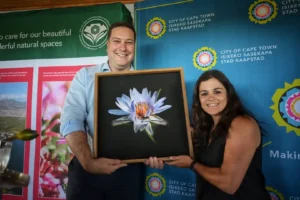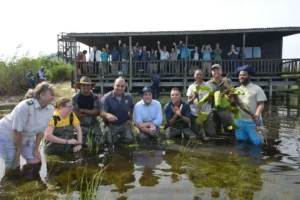Cape Town: At the culmination of the prestigious Earthshot Week in Cape Town, Mayor Geordin Hill-Lewis reintroduced the Cape Water Lily (Nymphaea nouchali var caerulea) at False Bay Nature Reserve: Rondevlei section, the Ramsar site of wetland significance.
It can be commonly observed in lowland wetlands on the Cape Flats until the mid-1900s. The flower are restored to the Cape Flats, in order to commemorate the Earthshot Prize, which was hosted on the African continent, for the first time.
Mayor Lewis said that this lily is a symbol of the legacy of ‘Earthshot leaves’ that are found in the city. These leaves recognise the local climate and conservation heroes, helping them in scaling their work, so that it can impact effectively.
They can now affectionately refer to it as the Earthshot Lily. Moreover, he mentioned about the Earthshot Prize Week which was hosted by the city and said that they are proud to announce that the City of Cape Town is reintroducing the Cape Water Lily to wetlands on the Cape Flats.

A special site has been selected in False Bay Nature Reserve: Rondevlei section, which is managed by the Biodiversity Management Branch. Residents of Cape Town will be able to view the Cape Water Lily as they will be re-established in the free-access nature reserve.
Lewis added that this further supports the international obligations of City of Cape Town towards biodiversity conservation. It refers to Ramsar City Wetland and a role model city in the UN decade of ecosystem restoration.
The Cape Water Lily would have been a significant part of Cape Town’s landscape and natural heritage in recent history. The Cape Water Lily received special mention in ‘The official handbook of the City of Cape Town’ in 1909 which was published by the Corporation of the City of Cape Town.
Cape Flats presented them with many showy flowers, such as numerous terrestrial orchids, Gladiolli, Heaths, etc. And the blue water lily, which made such a show in the vleis (ponds) should certainly be seen when in season.
The species have now become locally extinct on the Cape Flats, due to the pressures of habitat loss, pollution, augmentation that also consider historical harvesting, for the ‘Cut Flower Trade.’

Cape Water Lily is a far-ranging and common aquatic plant species. It occurs in different wetland habitats in Southern Africa such as slow moving rivers, small ponds and shallow vleis.
Deputy Chairperson of the Advisory Commitee: Water Quality in Wetlands, Waterways and the Coastal Environment – Councillor Alex Lansdowne said that restoring the culturally significant water lily to the Cape Flats is a symbol of the commitment to wetland conservation in Cape Town.
The future generations will now be able to see the Cape Water Lily in its natural habitat. These species will enhance the wetland ecosystem where it occurs and will support many other important species.
Earthshot Prize was founded by Prince William in 2020 and has become a powerful global search engine for unearthing the world’s most innovative climate and environmental solutions.
Notably, Cape town is the most biodiverse City in the world, comprising of the 20 vegetation types that occur in Cape Town, 11 are Critically endangered and seven occur nowhere else.
Biodiversity is natural heritage and it is unique and irreplaceable. The nature reserve network helps in making the city sustainable and more resilient through the ecosystem services that are provided by nature.

